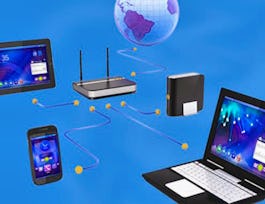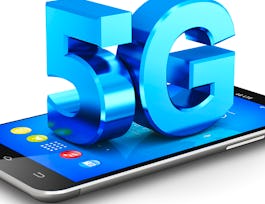In this course, participants will explore each topic comprehensively. The course begins with understanding peripherals such as USB connectors, Thunderbolt, and media readers, crucial for expanding system functionality.



Networking, Peripherals, and Wireless Technologies
This course is part of CompTIA A+ Certification Core 1 (220-1101) Specialization

Instructor: Packt - Course Instructors
Sponsored by Syrian Youth Assembly
Recommended experience
What you'll learn
Identify and configure essential peripheral devices for optimal system performance
Analyze and troubleshoot display technologies, and install graphics cards effectively
Understand and explain TCP/IP and dynamic IP addressing concepts
Configure and manage wireless networks, including enterprise-level setups
Skills you'll gain
- Network Switches
- Network Engineering
- Network Troubleshooting
- Technical Support
- Network Administration
- Networking Hardware
- Computer Displays
- TCP/IP
- Network Infrastructure
- USB
- Computer Hardware
- Hardware Troubleshooting
- Network Routers
- General Networking
- Computer Networking
- Desktop Support
- Peripheral Devices
- Network Support
- Network Protocols
- Local Area Networks
Details to know

Add to your LinkedIn profile
3 assignments
October 2024
See how employees at top companies are mastering in-demand skills

Build your subject-matter expertise
- Learn new concepts from industry experts
- Gain a foundational understanding of a subject or tool
- Develop job-relevant skills with hands-on projects
- Earn a shareable career certificate


Earn a career certificate
Add this credential to your LinkedIn profile, resume, or CV
Share it on social media and in your performance review

There are 5 modules in this course
In this module, we will explore the key peripherals used in modern computing, focusing on USB standards, configuration processes, and other peripheral technologies such as Thunderbolt and Lightning. You will also learn about optical media, scanners, and expansion cards, gaining practical troubleshooting skills.
What's included
9 videos2 readings
In this module, we will dive into display technologies, examining the construction of modern monitors, from LCDs to projectors. You will learn how graphics cards work, how to install them, and the fundamentals of resolutions, aspect ratios, and multi-monitor setups, including effective troubleshooting.
What's included
8 videos
In this module, we will cover the basics of networking, starting with LANs, switches, and routers. You'll gain insights into the practical use of networking cables, connectors, and tools, as well as how to troubleshoot network issues effectively.
What's included
8 videos1 assignment
In this module, we will explore TCP/IP fundamentals, dynamic IP addressing, and the structure of local area networks. You will also learn to work with DNS, port numbers, and router configurations, as well as how to set up and manage VLANs, all while acquiring troubleshooting skills for network issues.
What's included
11 videos
In this module, we will focus on wireless networking, covering the evolution of 802.11 standards and the hardware needed for Wi-Fi connections. You will explore mesh networks, enterprise wireless systems, and alternative wireless technologies like Bluetooth and NFC, along with troubleshooting methods for wireless issues.
What's included
6 videos1 reading2 assignments
Instructor

Offered by
Why people choose Coursera for their career




Recommended if you're interested in Computer Science

University of Colorado System

Yonsei University

Open new doors with Coursera Plus
Unlimited access to 10,000+ world-class courses, hands-on projects, and job-ready certificate programs - all included in your subscription
Advance your career with an online degree
Earn a degree from world-class universities - 100% online
Join over 3,400 global companies that choose Coursera for Business
Upskill your employees to excel in the digital economy




